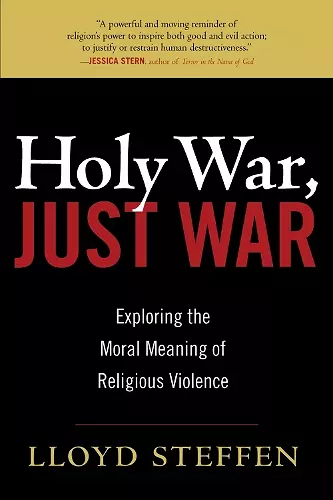Holy War, Just War
Exploring the Moral Meaning of Religious Violence
Format:Hardback
Publisher:Bloomsbury Publishing PLC
Published:29th Mar '07
Currently unavailable, and unfortunately no date known when it will be back
This hardback is available in another edition too:
- Paperback£37.80was £42.00(9780742558489)

Holy War, Just War explores the 'dark side' in Christianity, Islam, and Judaism by examining how the concept of ultimate value contributes to religious violence. The book states that religion has within its own conceptual tools the resources to understand its own dark side and that religious people must subject their religion to a moral vision of goodness and constrain those parts that make for violence and hatred.
This is urgently relevant, present-tense theology on the power of religion to inspire either slaughter or peace. Lloyd Steffen candidly subjects religion—and even God—to deft exploratory surgery. -- David C. Maguire, Marquette University
Steffen makes a thoughtful argument for a bold, indeed a radical idea. The god that most of us want is a god of absolute power and control who assures a steady course towards goodness no matter how morally chaotic the appearance of things may be. But Steffen argues that the idea of such an absolute god is necessarily linked to religiously legitimated violence. If we want to ameliorate the human condition we need a new understanding of 'the ultimate'. If, as Steffen argues, our understanding of god must be measured by the moral consequences of those ideas here on earth, then traditional theology has a long ways to go before it becomes less dangerous to humans. -- John Raines, professor of religion, Temple University
Lloyd Steffen offers a much needed corrective vision of religion, and its destructive potential. The Demonic Turn is an important contribution to understanding that the margin between peace and violence in religion is always on the verge of collapsing, and often does so, with tragic consequences for humanity. -- Hector Avalos, Iowa State University
A powerful and moving reminder of religion's power to inspire both good and evil action; to justify or restrain human destructiveness. Steffen argues persuasively that religion itself must be subject to moral scrutiny, and that our deliberations about the goodness or badness of our contemplated actions require moral - not just religious - reasoning. At a time when leaders are increasingly motivated by their interpretations of religions teachings, this book teaches us that every one of us - especially political and religious leaders - has the obligation to ensure that our conceptions of ultimacy not be overtaken by absolutist thought. -- Jessica Stern, Harvard University, author of Terror in the Name of God
In this important book, Lloyd Steffen argues persuasively that religion is ultimately about human choices. Whether religion serves or destroys us will be determined by the integrity of our moral vision of goodness and our willingness to allow that vision to challenge religiously inspired violence. -- Jack Nelson-Pallmeyer, professor of justice and peace studies, University of St. Thomas, author of Is Religion Killing Us? Violence in the Bible and t
This book persuasively argues that religion is like fire: powerful, dangerous, and in need of control. This thesis is applied to an interesting variety of examples: Japanese kamikaze pilots, the suicides at Jonestown, attacks on abortion doctors, and the terrorism of September 11. Each example of religious fanaticism helps illuminate the difference between life-affirming and demonic religion.
The second half of the book provides a useful critical examination of three rival ideas about the justification of violence: pacifism, holy war/jihad, and the just war tradition. Steffen argues that even pacifists can become 'demonic' when they embrace absolute pacifism in a fanatical fashion. And he concludes that, despite its imperfections, the just war tradition represents the most moderate approach to the justification of violence.
In the end, the book provides a powerful defense of the idea that we should use morality to criticize demonic religion. But this book is not anti-religion. It avoids an outright rejection of religion and admits that religion can be life-affirming. However, it does challenge religious believers to apply moral judgment to the religious traditions that provide meaning to their lives.
ISBN: 9780742558472
Dimensions: 238mm x 161mm x 29mm
Weight: 612g
330 pages